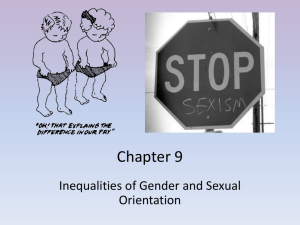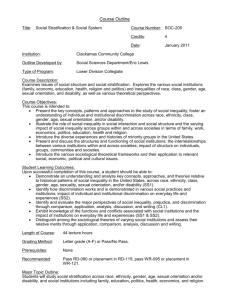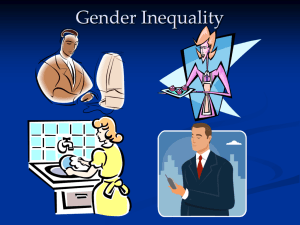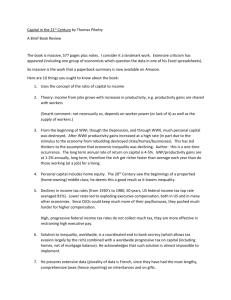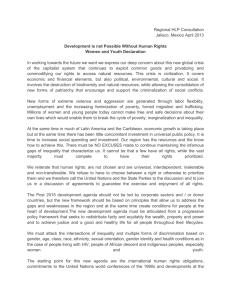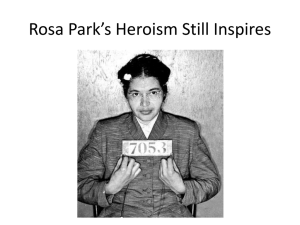Ch. 11- Sex and Gender
advertisement
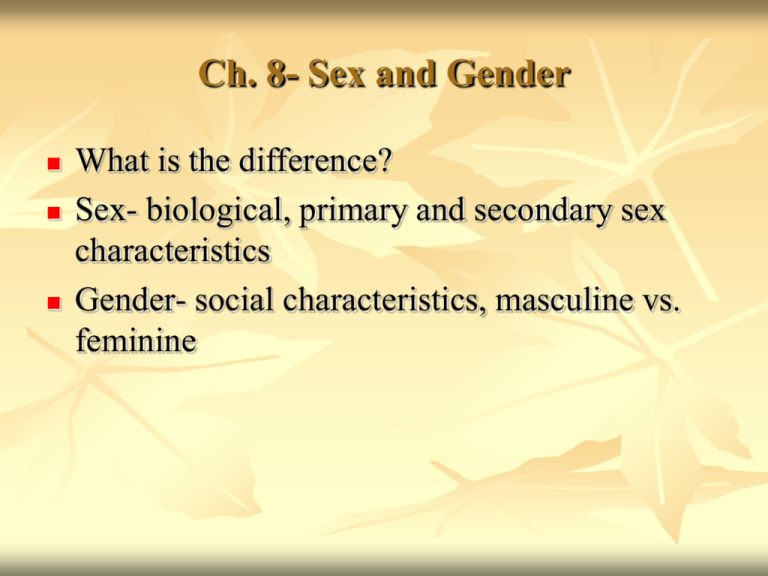
Ch. 8- Sex and Gender What is the difference? Sex- biological, primary and secondary sex characteristics Gender- social characteristics, masculine vs. feminine Gender differences in behavior Biology vs. culture? Standards of beauty defined by culture 2 view points- differences come from… Culture- socialization, learned, gender discrimination Biology- socialization reflects inborn tendencies, patriarchies vs. matriarchies Sociological viewpoint- social factors cause gender differences in behavior; physical differences lead to separation of groups Biological viewpoint A medical accident- 1963 Baby twin boys, circumcision gone bad Social factors viewpoint Vietnam veterans study Men w/ higher levels of testosterone were more aggressive Social class differences Gender stratification Different access to privileges Unequal access to power/prestige Society controls members Gender inequality Men- active/strong; Women- passive/weak Masculine stereotype- instrumental Feminine stereotype- expressive Study of married couples Sexism Prejudice based on a person’s sexual category Women as a minority group Based on gender Ascribed status Socialization- dependence Work roles/household roles Non- Caucasian females Origin of women as a minority group Patriarchy vs. matriarchy Social consequences of biology Hunting and gathering societies Struggle for equal rights Second class citizens Husband and wife one person- him Rise of feminism: belief that women should be politically, economically, and socially equal to men Suffrage movement Right to vote, 19th amendment WWII – shortage of workers Women left the home Continued gender inequality Coronary bypass surgery- women vs. men Struggle for equality in recent decades Affirmative action Title IX of Educ. Amendments in 1972 Family and Medical Leave Act Former Pres. Clinton Sexual Harassment Legislation Breast Cancer Research Movies show women in non-stereotypical roles Church of England Sex typing- the assoc. of behaviors w/ one sex or the other Male vs. female activities Varies by culture Prestige given to male activities Education- 2/3 of illiterate adults are women Gap between men and women (closing) Professional degrees Gender tracking- male/female distinctions w/ in degrees Politics- unequal access to national decision making Gender inequality in sports Title IX WNBA, WPFL Media coverage lacking Gender inequality in everyday life General devaluation of femininity in U.S. Femininity= lack of accomplishment Inequality in conversation Gender inequality in the workplace The Pay Gap- women average less than men in every nation U.S.- women earn about 65% of what men earn (it’s actually gone down!) All levels of education Due to job choice and discrimination Occupational segregation The Glass Ceiling- barrier that keeps people from rising past a certain point Women in support positions Crack glass ceiling The Glass Escalator- men in traditionally female occupations accelerated into higher level positions, paid more The Mommy Track Mommy track vs. fast track Daddy track? Violence against women China, Europe, India Female infanticide Female circumcision- Africa, Malaysia Gender inequality of violence Forcible rape vs. date rape Murder Violence in the home- spouse battering, marital rape, incest Sexual harassment- abuse of one’s position of authority to force unwanted sexual demands on someone Quid pro quo Hostile environment Blatant sex discrimination Subtle sex discrimination Covert sex discrimination Women in the criminal justice system Judges more lenient w/ women killers Minority women and traditional cultures Dependence, poverty Connection between violence and masculinity must be broken


